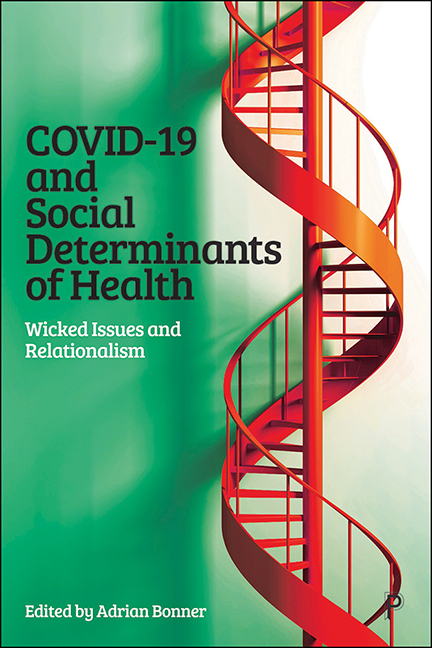Book contents
- Frontmatter
- Miscellaneous Frontmatter
- Contents
- List of figures and tables
- Notes on contributors
- Foreword
- Introduction
- Part I Wicked issues and relationalism
- Part II Regionalism and geopolitical environments
- Part III Public sector, COVID-19 and culture change
- Part IV The third sector
- Part V The case for relationalism
- Part VI Engagement and proposed changes
- Conclusion
- Appendix The Centre for Partnering
- Index
10 - UN sustainability goals and social value: local authority perspectives
Published online by Cambridge University Press: 18 January 2024
- Frontmatter
- Miscellaneous Frontmatter
- Contents
- List of figures and tables
- Notes on contributors
- Foreword
- Introduction
- Part I Wicked issues and relationalism
- Part II Regionalism and geopolitical environments
- Part III Public sector, COVID-19 and culture change
- Part IV The third sector
- Part V The case for relationalism
- Part VI Engagement and proposed changes
- Conclusion
- Appendix The Centre for Partnering
- Index
Summary
Introduction
In this chapter the concepts of social value reviewed by Liddle in Chapter 8 will be developed to include environmental value and, in particular, the wicked issue of climate change. Liddle critically reviews the literature on public and social value, and the historical development of these ideas in relation to New Public Management and the quantification of social value in relation to the relative importance that people place on changes experienced in their lives from a wellbeing perspective. Using a combination of accounting and economic measures, the Chartered Institute of Public Finance and Accountancy and Deloitte have used international accounting standards and UN Sustainable Goals.
Social value and environmental value is defined with reference to the different approaches through the lens of various organisations and, where focusing on environmental value in this chapter, it covers its impact at an international, national, regional and local level in particular with reference to climate change strategies and with references to housing. More detailed discussion of housing will be presented in Chapter 11, and youth employment in Chapter 12.
Global climate change concern
Concern and debate relating to climate change is not new. While provisions on climate change were adopted in the ‘Declaration of the United Nations Conference’ on 16 June 1972 in Stockholm, it was not until much later that decisive action could be said to have occurred. The size and scale of the problem was noted at the time within a statement released on 16 July 1992 by the Union of Concerned Scientists, a group of leading US scientists dedicated to raising issues around climate change. In its press release it noted that ‘human beings and the natural world are on a collision course’ and went on to outline specific areas of environmental concern, namely, the atmosphere, water resources, oceans, soil, forests and living species Union of Concerned Scientists, 1992).
The United Nations Framework Convention on Climate Change
In May 1992, underlining the need for a Framework Convention on Climate Change (FCCC), the UN stated that ‘human activities have been substantially increasing the atmospheric concentrations of greenhouse gases, that these increases enhance the natural greenhouse effect, and that this will result on average in an additional warming of the Earth’s surface and atmosphere and may adversely affect natural ecosystems and humankind’ (UN, 1992).
- Type
- Chapter
- Information
- COVID-19 and Social Determinants of HealthWicked Issues and Relationalism, pp. 192 - 209Publisher: Bristol University PressPrint publication year: 2023



